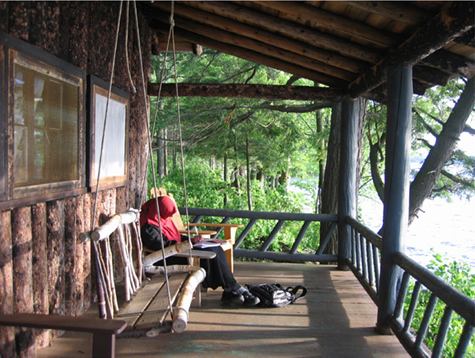Things I Wish Everyone Knew on Facebook
Pictures of you with your spouse on Facebook are all well and good, but not when you look like a fisherman showing off your latest catch.

“Look what I got, y’all!”
A certain level of PDA is perhaps also fine, but anything that you would not do in front of your imam or parents probably shouldn’t be posted online.

If your spouse bought you a gift of flowers, jewelry, etc, only share pictures of them with people to whom you would actually say in real life, “Look what my hubby got me! Isn’t it great?” Sharing such info with people outside your close circle can lead them to feeling envy and resentment.
Not every quote pasted in an interesting font in front of a stock landscape photo is deep or meaningful.

How to inspire others (?)
There is a fine line between pictures that are flattering and those that are outright deceptive.
Extreme closeups of your beautiful eyes, lips or other features are certainly attractive, but often seem like a cry for attention. If you wouldn’t let someone get that close to your face in real life, then it may be better to zoom out a little.

Please don’t use gang signs if you don’t know what they mean.
Passive-aggressive status messages (that direct a message to a general ‘type’ of people who say, do or believe a certain thing) are usually ineffective and make you look self-righteous.
The insistence with which you ask me to ‘like’ or ‘subscribe’ to something is conversely related to how likely I am to do it.
The only thing more annoying than reading a message that was poorly worded, misspelled, or structured in a grammatically awkward way is reading your pithy correction of that message.

Broad complaints about Facebook being a corruption of meaningful discourse, relationships, or religious boundaries loses some merit when you are using the very thing you are condemning.

If you send a friend request with an obscure nickname, your profile picture set to a random stock photo, and no personal information visible about you, I really don’t know who you are (and probably won’t add you.)
Graphic pictures of dead children or other grave and serious images of war and tragedy are jarring and out of place on a newsfeed between people’s Instagram shots of their newest outfits and the latest amusing Youtube video.
Please only share pictures of whatever food you’re eating if you are willing to deliver some to my house 🙂 (Or at least share the recipe.)
Sharing your opinion about political issues or religious matters when you have no qualification to do is is just like a child trying to talk like a grown up: It’s cute, but don’t expect anyone to take you seriously.
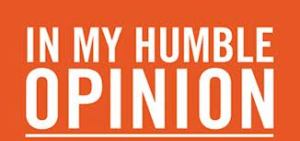

Pictures of cats are always acceptable.

Example of acceptable cat photo. Due to its high cuteness level it can be inserted anywhere on Facebook, even mid-sentence.
 Love me.
Love me.
 What may happen after this post.
What may happen after this post.
Being Soft in a Hard City
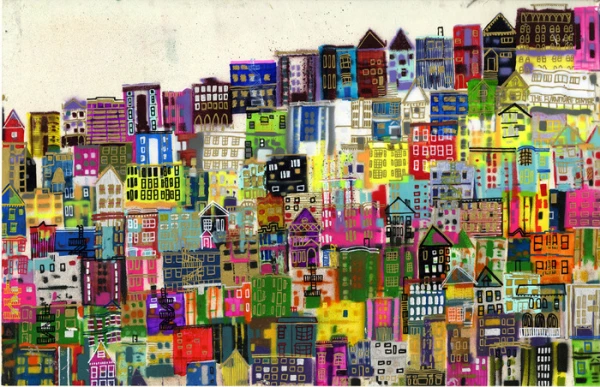
I’ve always been “soft”… sensitive, quick to tears, easily moved, and emotions easily provoked. I’m usually unable to hide my real feelings about much of anything, and am easily persuaded by the emotions of others. I’ve been taken advantage of more times than I can count because I just couldn’t make a demand, insist on my side of things, or initiate a confrontation. Instead, I’m often left stunned and helpless, swimming in my own feelings, only to think about what I should have done and said looking back at things later. If I’m hurt, I turn grief inwards, instead of the more survivalist instinct of hitting back just as hard. This has always been my nature, and those close to me always knew it to be so.
I don’t believe I feel more deeply than others, but the natural guards and instinctual shields other people have to protect themselves are somehow absent from my nature. Like anything, extremes are always damaging, and I always wished that I could make myself tougher and braver in my dealings with others — to be able to guard my feelings and expressions, so not everyone could read my genuine feelings about an issue… to clearly tell someone that they are wrong, unfiltered by niceties or subtle turns of phrase… or insist on my right to something, and have the other party be the one to defer for once and give in.
In the last few years, I’ve started to see such changes in me. Cairo, by its nature, is an abrasive city that sharpens one’s edges, and along with making one tougher can leave one with a deep cynicism for humanity. It can also instill a stinginess in a person, causing one to close in on themself, since being open and generous – whether in terms of physical possessions or emotional investment – is so often taken advantage of.
In my last year here, I’ve done things I never thought I was capable of: fiercely arguing with a taxi driver who intentionally took the longest route possible to our destination, insisting on proper seating at a restaurant when a waiter was being obstinate, coldly responding to a seller who asked too many prying questions. These everyday conflicts are things that would have left me speechless and teary eyed just a short while ago.
I feel like I’ve become tougher, and while in some ways it may be good, it scares me. I see a hardness and cynicism in the faces of many men and women here that I don’t want to see when I look in the mirror. There’s a softness of disposition, an innocent idealism when dealing with others, that even if impractical I don’t want this big bad city to steal away.
There’s a fine line between being strong and being callous, and I hope that these years in Cairo make me stronger, but do not efface any personal sense of softness, adab, kindness, warmth and gentleness that I may possess. These are prophetic qualities that I hope to inculcate and develop, and like a diamond, hope will only shine brighter at attempts to chip them away.

Microbus Adventures
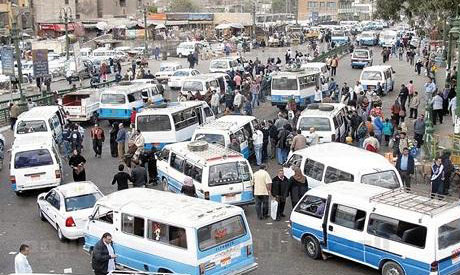
Some microbuses on a street in Cairo.
For anyone who has lived in Cairo, taking public transportation is something that can turn an ordinary day into a crazy one. Microbuses, the little mini-vans that zoom around most of the major routes of the city to pick up passengers, and whose fares are dirt-cheap, offer a wide spectrum of perks along with getting to your destination, including:
The Death-Wish Driver: Here, the driver (who usually looks about fifteen) will use every maneuver possible to cut through delays (including going head-on into oncoming traffic), and drive faster than possible belief or reason. I have literally thought I was about to meet my end, more than once, in a microbus, and now find myself instinctively reflecting on my mortality and saying the shahada whenever I sit in one. I suppose that its good for your iman… and makes you somewhat thankful for all the traffic that keeps them inching along for the most part, instead of speeding as if when they die they can just stick in another quarter for another round…
The Creepy Guy: Yes, sisters, along with getting to where you need to go, some microbuses come fully equipped with a creepy guy with googly eyes, or worse yet, roaming hands. What I have learned is that if someone is being weird or making you at all uncomfortable, there is usually a reason for it and you should move far, far away (or dropkick them). The vast majority of passengers are just normal people getting to where they need to go, but it does happen and is something to be conscious of, especially if one looks clearly foreign.
The Full-Tilt Chair: These are the chairs that fold down to make for additional seating, and I have found that about 70% of the time they are busted in a way that makes you feel that you are A) either sitting on a slanted see-saw, or B) leaning so far back that the person behind you can break out some tools and do some dental work on you. On the plus side, I’m sure it must help you balance your chi.
My other least favorite spot is sitting in the very back row, when there is an unrelated passenger already sitting in the seat facing the aisle. When you are trying to exit the bus, you have to basically climb over that person to reach the door, and let’s just say it can get a little too close for comfort or any level of appropriateness. I suppose it is a good thing that everyone on the microbus are strangers – if I was in that situation and it happened to be a brother I knew sitting there, I don’t think I’d ever get off the bus. I’d just keep on riding…
The Wannabe DJ: The only thing some of these microbuses that have the music blasting are missing are the hydraulics that some of the kids in the ‘hood used to have on their low riders, that make the whole car bounce up and down with the beat. (Actually now that I think about it, speeding over the ditches and speed bumps kind of gives the same sort of feeling…)
All kidding aside, a taxi ride probably costs around five times as much as a microbus would along the same route, so anyone who is planning on spending a longer amount of time in Cairo (and is not independently wealthy) should learn some of the basic routes. The other huge benefit of microbuses is that there is no call for haggling with the driver (which happens to many of us foreigners, even if the meter is supposedly running) and one is not alone with the driver which can be uncomfortable in a taxi. My only further suggestion for microbuses would be to perhaps do some math exercises before sitting in one. If you end up in the “cashier” seat, you spend most of the ride figuring out how to make change for various people’s fares and passing them and back forth between the passengers and the driver. One of my friends told me about a guest who visited them who took a microbus with them, and after spending most of the trip helping to open the door for people and passing money back and forth said, “Man, they should be paying me (not the other way around)” 🙂
In closing, I would say that a must-see for anyone who plans on spending time in Cairo is Maydan Sayyida ‘Aisha, a main hub for microbuses where buses, street sellers, crowds of people trying to get somewhere else, noise and dust converge into an unbelievable rush which is unlike anything I’ve experienced before. Contrasting the rarefied aisles of City Centre or City Stars (the posh shopping malls) to the grit, dust and chaos of this area really gives you a glimpse into how contradictory and complex this city is, and how many different narratives it comprises.
This is somewhat a lighthearted post so I apologize for any offense caused. I am also not complaining, but just finding amusement in the sometimes-craziness of this experience which is, in its entirety, an immense blessing, alhamdulillah.
Salaam
My Ultimate Guide to Traveling with a Little One
My son, Ibrahim, flew before he could walk. When he was a month old we took our first flight together from New York to Texas, and now, at three and a half, we’ve flown across the country and across the Atlantic more than a dozen times. We’ve had smooth and comfortable experiences as well as turbulent and stressful ones, but I thought I’d share with you all a few things I’ve learned (sometimes the hard way!) on flying with a little one.
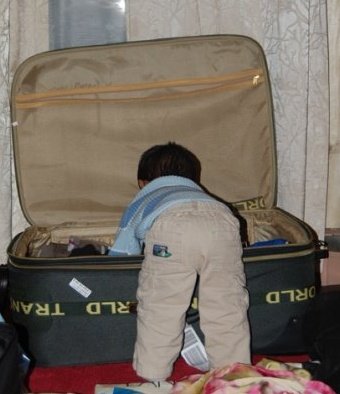
My son at age one and a half helping me pack.
Get Philosophical
Though it can be enjoyable in some ways, it’s good to go into an upcoming trip with the understanding that traveling is, by its very essence and nature, something that requires patience. I’ve often heard people joke that, “that’s why they call it suffer” (Safr is the Arabic word for travel. :)) There’s a statement of one of the companions of the Prophet (peace be upon him) that says that traveling with someone is a great way of getting to know their real character, which I think is very true as it’s a time when a person can be tested in many ways and has to deal with various frustrations.
If you can accept and ready yourself mentally and spiritually for the upcoming challenges that come with travel, it will make it that much easier when there is a hold-up somewhere in line, your little one spits up on you before you even make it to the plane, or when you’re asked to step aside for ‘random selection’ (yet again :))
Also, keep in mind that when traveling you will, at least at some level, be dealing with a large group of people who are really a complete mix of attitudes and personalities. You may meet some really lovely and interesting people, and at other times come across those few who feel the need to make a snide remark or in other ways show a level of rudeness to you or your child.
Just remember, even if your child ends up acting up or crying a lot on the flight and someone does react negatively, that the ‘offended’ person could have easily requested another seat or purchased their own noise-canceling headphones (which most seasoned travelers do), that you will most likely never see that person again in your life, and that some people are just unnaturally dissatisfied with the world, and if it were not your child crying it would perhaps be something else that they would have found to grumble about to their seatmate.
In short, as long as there is no serious injury done, most of these matters will be forgotten about within moments of stepping out of the airport. Everyone on that plane will walk away to their own lives (A nice time to reflect on Quran 2:148), so one shouldn’t take anything to heart and realize how temporary the situation is (like many other things in life :))
For the Airport
▪ Find out beforehand what the luggage allowances are for your little one. They usually vary depending on the airline and the age of your child.
▪ Weigh your bags at home and try to keep them below the required weight. It can be a difficult task if they ask you to lessen the weight of your bags at the airport and you have to juggle a little one and sort through your bags there. If you’re finding it hard to keep below the limit in each suitcase, try to spread heavy items out between the bags so no one bag is too overweight. Prepare a few of the heavier non-liquid items towards the top that could be easily shifted into carry-ons if they ask you to remove things. Keep an extra plastic bag or canvas tote bag in the front pocket of your carry-on in case they ask you to shift items out.
▪ Don’t feel rushed. Try to give yourself some extra time by getting to the airport a little earlier. Take your time. If your child is crying, it is well worth it to sit out for a few minutes until you and your child are calm then try to check-in or go through security with the baby crying in your ear. The more stressed you are, the more stressed your baby will be and vice versa, so try to keep yourself and little one chill 🙂
▪ If you were not able to book the bassinet seats beforehand, go early to request them because they usually get taken up quickly. The front, bulkhead seats are also nice even if you don’t use the bassinet because they give a somewhat more open space for kids to play, and you don’t have to worry about them kicking the chair in front of them. They may offer to seat you in a row with a number of empty seats instead of the bulkhead row, which may be a better choice if your child is slightly older (to have a place to lay him down to sleep).
▪ Bring a baby carrier/sling along with your stroller, especially if you are traveling by yourself. The carrier can be very helpful when going through security, and also once on the plane. Before getting in line for security I would always put baby in the carrier and then had both hands free to fold the stroller, take electronics out of bags, take off shoes, etc. It’s also nice to have on the plane if you need to take down your bag or do other things with both hands. I’ve even strapped baby in while sleeping on the plane – I liked having him close and didn’t have to worry about him falling or sliding down.
Keep in mind that they may ask you to take it off when going through security (I’ve had some allow me to leave it on and other require me to take it off) so make sure you know how to put it on and take it off comfortably.
▪ Try to group together liquids into one ziploc bag that can be easily pulled out at security. Later you can put things back in their separate places if necessary.
▪ If you’re traveling with a laptop, you may want to forgo a separate laptop bag and put your laptop in a sleeve in a larger purse or carry-on bag. This will mean less bags to carry overall and an easier time at security (They usually do not require you to take the laptop out of soft-covered sleeves).
▪ If you’re Muslim randomly selected, be prepared for all of your bags to be opened up, things taken out, and stuffed back in again at security. Once you get through, it may be tempting to just zip things up and hurry away as others seem to be doing, but it may be a good idea to move to the side (they usually have a bench or chair there for this purpose) and re-organize things, put your jacket back on, kid’s shoes on, etc. This will make it much easier for you to start your flight with everything organized and arranged the way you had planned, and also make sure nothing gets left behind.
▪ Many of the larger airports have prayer rooms which may be a more comfortable place to wait with little one (and offer a few raka’at :)) before take off.
▪ You can keep your stroller with you until you reach the gate and then check it in planeside.
For the Airplane
▪ It usually gets quite cold on the airplane, so dress little one (and yourself) in layers. (Ex. a full-sleeved shirt or hoodie over a half-sleeved shirt)
▪ Put your little one in comfortable, loose clothing that you assume will get messy during the flight. Pack an ‘Arrival Outfit’ (the complete outfit with top, pants, socks, fresh diaper, etc) in a big ziploc bag, to easily pull out for a quick change after the descent and to stuff the old clothes in. It’s best to wait to change baby until after you’ve actually landed and gotten off the plane; things do happen in those last few minutes of descending, which can be hard on a baby’s ears and tummy. It’s usually easy to find a bathroom on the way to baggage claim, and there you have more space and you can put baby in the stroller while you freshen up yourself.
▪ Visit the Dollar Store, the dollar bin at Target, (or the 2.5 guinea store if you live in Egypt :)) and stock up on a number of new toys. I usually combine these toys with some old favorites (but nothing precious, expensive or that would cause sadness if lost.) The trick is to have enough toys and things to cover the duration of the flight; when little one gets tired of one thing, put it back and pull out something else to keep them busy and interested.
Another tip: introduce your child to the new toys a few days before the flight so they are somewhat familiar and interested in them, then pack them away for the flight. (Something I learned the hard way, when on one flight I pulled out all new toys that seemed completely strange to my son.) Also make sure you hide them well, I’ve also had my bag of toys ‘discovered’ beforehand 🙂
Some of the best toys I’ve gotten for cheap are a little wind up train with tracks that snap together (which he played with on the tray table), sticker books (which are better than markers/ crayons which can get lost and slide under the seat), party favor bags that have lots of random things like yoyos etc, a travel-sized Magnadoodle, flap up books and other new interesting books to read.
▪ Bring a ton of dry, non-messy snacks in little ziploc bags like raisins, goldfish crackers, dried fruit pieces, etc. and dole them out slowly over the flight. I’d also try to have lollipops or a type of candy like smarties on me, which are great for when the plane is ascending and descending to encourage older children to keep swallowing and reduce the pain in their ears. If you have an infant, giving them a pacifier or nursing them would probably be best during those times.
I admit that I also keep an emergency pack of chocolate (M&Ms or something similar) – to pull out if things are getting bad or little one needs some sweetness 🙂 I would say in general to be flexible when traveling on these sorts of rules (sweets or on watching a cartoon on the screen provided in front of the seat, or playing games on toy computer etc). It’s only temporary and back on the ground you can revert back to your usual healthy habits 🙂
▪ If you want to know in detail, this is usually how I organize my carry-ons for the plane: I usually carry three bags with me –
1. A Baby Bag: I actually normally use a backpack instead of a baby bag, since it’s very roomy, easy to carry and has nice compartments – but you can use any bag that sits upright and that preferably has a zipper to avoid things spilling out or getting lost. This is the bag that I keep with me, by my legs or under the seat, that I’m constantly using throughout the flight so I try to make it the most organized.
In the very front pocket I usually put medicines, and in the side pockets I put sippy-cups/bottles. There are usually two separate zippers to inner compartments; In the one closer to the front I put all the snacks and toys, books etc for the flight. In the back compartment I stack extra baby clothes (the ‘arrival outfit’ and one other outfit), then diapers and wipes.
2. A Purse: Make sure to use one that has a zipper. I usually put only my own personal items in here (as well as my Dell Mini – which is great to travel with and fits in most purses) and immediately stow it under my seat.
3. I take a larger carry-on (the suitcase style one with the pull-out handle) and put everything in it that I will most likely *not* use on the flight. This includes heavier items that I couldn’t put in the suitcase like books etc, and also ‘emergency’ items if there is an extended layover or something similar: toothbrushes and toiletries, an extra outfit for me, some additional extra diapers and wipes and a few extra outfits for baby. This is usually stowed overhead and not taken out again until we have landed.
Other Quick Tips:
▪ Take a few extra plastic bags. They usually come in handy as a little trash bag or to store different things. (I almost always take off little one’s shoes as soon as we are seated, put them in a plastic bag and put them away in my purse so they don’t get lost.)
▪ Put each toy with its various pieces in separate plastic ziplocs to easily pull out /put away.
▪ Take lots of extra wipes and tissues.
▪ Use overnight diapers to help prevent accidents, and pull-ups even if your child is potty trained just in case.
▪ If there is an accident or spill on the seat, you can take one of the blankets the airplane provides to lay over it.
▪ Some medicines you may want to have on hand on the flight: Infants’ gas drops, Childrens’/Infants’ Tylenol, teething tablets, anti-nausea medicine, and a mini first-aid kit with bandaids and Neosporin.
▪ Make a little package of a few wipes, diapers and changing pad to pull out easily when going to the bathroom to change the baby. It is much easier to pull that out to take to the restroom than lugging your whole bag with you.
▪ By all means walk around the plane and let little one walk around to get a little exercise and change of scenery. This is usually a good way of keeping your child in a good mood before reaching a point of frustration and boredom.
▪ Buy a bottle of water after going through security. They can be pretty stingy about it on the plane and it’s always good to have in case baby is feeling some nausea or parched.
▪ Lastly, enjoy your adventure with your new mini world traveler! Happy traveling 🙂
——-
If you have experience traveling with a little one, I would love to hear your thoughts, advice and suggestions in the comments! Please do share!
Finding One’s Path
Rumi says that every person is born for ‘some particular work’ and I think that this is true; it’s all too evident in the way some people do certain things with an unconscious fluidity and naturalness that other people can only seek to imitate. For some it is the instinctual ability to nurture – whether it’s their own children or friends they take under their wing, providing them with warmth and comfort, a present heart and a listening ear. For others it is an uncanny brilliance in learning, for whom conversation is less about sharing experiences and instinctively a means of sharpening their ideas against another mind. Some have a gift of the eye and can make anything visually pleasing. In a cursory glance they see what is visually discordant in a setting, and in moving a lamp or choosing a different shade of clothing can immediately find the most beautiful aesthetic in a way that is almost subconscious. There are those who are naturally disposed towards the spirit, for whom the company of other people is naturally abrasive, and for whom comfort is found only in mention of the Divine and divinely related matters.
There are some who don’t even realize the special gift they are given, or seem to be forcing themselves into another mold, but for an observer it is an evident reality as clear as the rising sun. They were meant for a certain work, a certain path. Perhaps it is easier to see in others than in ourselves.
—
I’ve always had a special relationship with words. I could never seem to acquire or read fast enough through books, especially in my adolescence. A particular turn of phrase, a new word, an especially eloquent passage would be as delicious as some sumptuous sweet, to be savored and appreciated slowly. I would write feverishly at night, in bursts in the day, in class, on the margins of my notes, feel, think and dream about writing.
The closest description I have found to these feelings is in the words of Chilean poet Pablo Neruda, describing when he wrote his first lines of poetry. He says,
I did not know what to say, my mouth
had no way
with names,
my eyes were blind,
and something started in my soul,
fever or forgotten wings,
and I made my own way,
deciphering
that fire,
and I wrote the first faint line,
faint, without substance, pure
nonsense,
pure wisdom
of someone who knows nothing,
and suddenly I saw
the heavens
unfastened
and open,
planets,
palpitating plantations,
shadow perforated,
riddled
with arrows, fire and flowers,
the winding night, the universe.
—
Even as I have matured and often find it more difficult now to bare honest parts of myself to others through words, I still want to write, try to write, and dream about writing. Even when I find difficulty in it, staring at a blank screen and a blinking cursor or a blank page, there is a sweetness and comfort in trying to bring together an order to the words swimming through my mind. There are times still when the words course so strongly through me that they seem almost physically palpable, times when if I were cut I feel that I would surely bleed ink before blood. This is why I think sometimes that this path was meant for me.
—
In my time abroad I have visited many places of historical and spiritual significance (alhamdulillah) – but two of the most poignant, intense and deeply personal of these experiences have been visiting the maqams of people who had deep relationships with words. These are the authors of the Hikam (Ibn Ata’illah) and the Burda (Imam al-Busiri), respectively.
These writers produced works difficult to describe in their depth, eloquence and brilliance, works clearly manifest from an illumined inner state and a heart connected with God Most High.
It is something incredibly moving to consider how blessed such people were, who were granted a special gift, used it for His purpose, and were honored with His favor. They used the abilities they were granted to produce something of remarkable spiritual beauty. I can’t think of a better life for anyone who has been moved to put words to paper.
I struggle on many levels with writing, but when I contemplate on such people I am at turns tremendously inspired and anxious. My mind turns, by and by, to hope and to fear: Is this a gift? Is this an opportunity? Is this a passing fancy or a self-seeking inclination? Or is this nothing at all?
I can think of no better way to live one’s life than to do what one was meant to do and be blessed in it. May God help us find our path, our ‘particular work’ and reach its ultimate, noble objective, which is a deeper knowing of our Lord and gaining His nearness. Ameen.
A Wall Speaks a Thousand Words
Some interesting graffiti I passed by on a recent walk through a neighborhood here in Cairo:
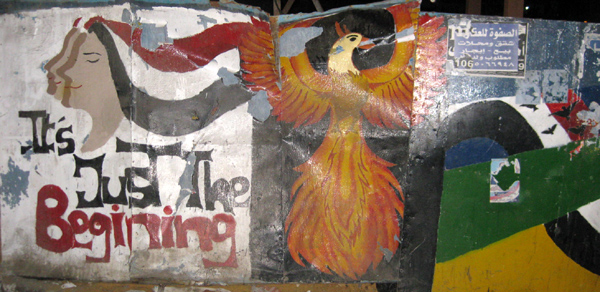
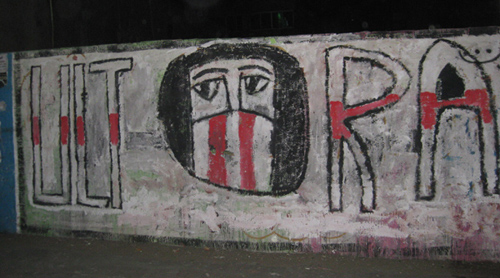
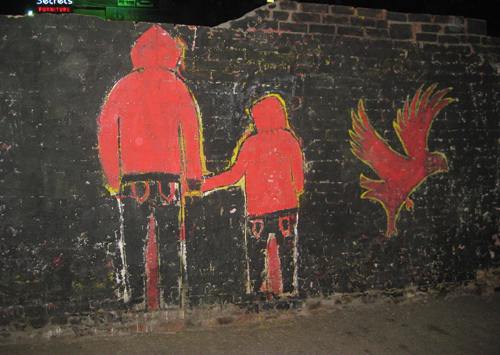
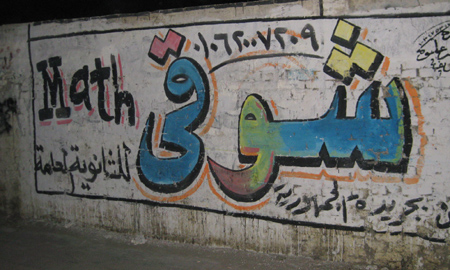
The last picture is actually part of an advertisement for a high school. You can find these types of ads for nurseries, schools, etc on many walls all over Cairo.
These are some pictures of the outside walls of a high school with some verses from the Quran and prophetic traditions (also quite common to see here):
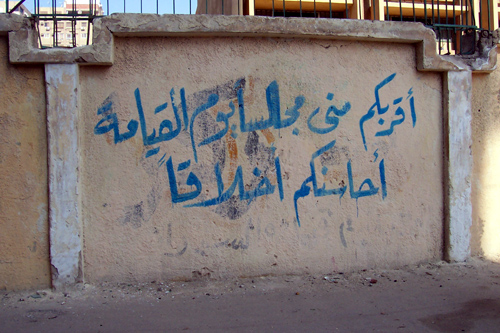
“The closest of you to me on the Day of Judgment is he or she with the most beautiful of manners and character.” (Tradition of the Prophet Muhammad, peace be upon him)
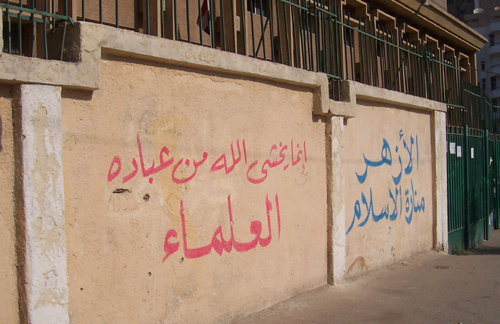
L: “It is only those who have knowledge among His servants that fear and have consciousness of God” (Quran 35:28)
R: “Al-Azhar is a beacon of Islam.” (This was an Azhar affiliated highschool)
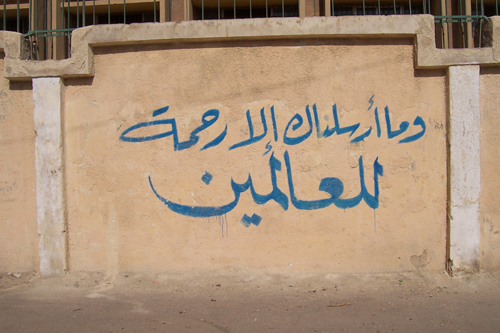
“And We have not sent you except as a mercy to the worlds.” (A verse from the Quran, in a description of the Prophet Muhammad)
The Cairo Book Fair
It is narrated that many people of earlier generations used to pray, “Allahumma ballighnaa Ramadan” (O Allah, allow us to witness the upcoming Ramadan) and I think many of the students here in Cairo pray in a similar way for the blessing of witnessing the annual book fair. 😉 The Cairo International Book Fair is one of the largest fairs in the world. It’s a huge gathering of book sellers from all over the globe which often has more than two million visitors each year. This year was especially anticipated since last year’s fair was cancelled due to the protests leading up to the revolution.
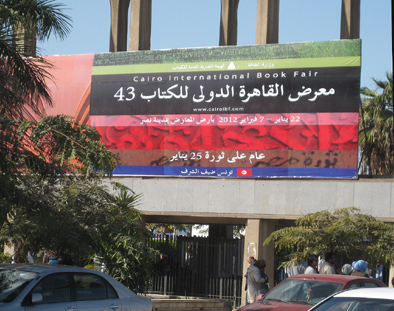
A banner at the main entrance of the book fair.
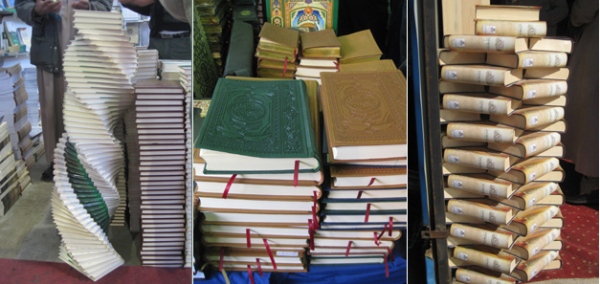
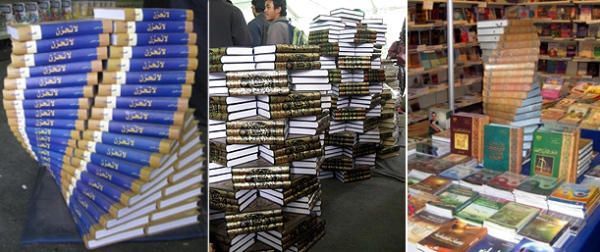
Some interesting displays at the fair.
Here are a few tips for those who may be attending next year (And please feel free to add your own suggestions for those who have experienced it):
– Start preparing a list of books you are interested in beforehand, since the book fair is HUGE and can be overwhelming if you are planning on simply browsing. You may also want to go with someone who has previous experience at the fair to help you navigate between the various tents and booths.
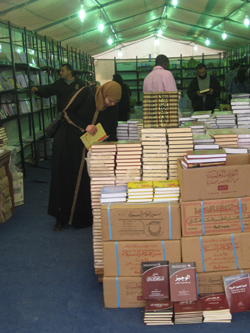
Shopping at the fair.
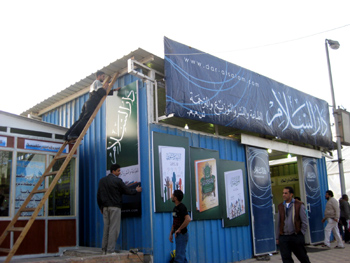
Workers put up a sign at one of the fair's many tents.
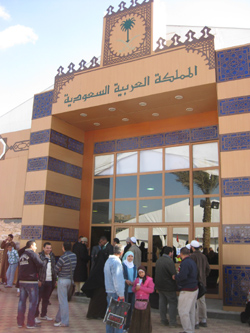
The tent for Saudi publishers, one of the largest at the fair.
– Get recommendations from teachers and other students about books, not only with the title and author’s name but the publisher they would suggest. Unlike English books there is a huge variation in the quality of Arabic books depending on the publisher, with some notorious for printing works with glaring errors, missing words, indecipherable fonts, etc, and others known for better quality and editing. When it comes to classical works there may be different editions and multiple commentaries, so make sure to consult with others and find out the specific edition that would be most beneficial to you.
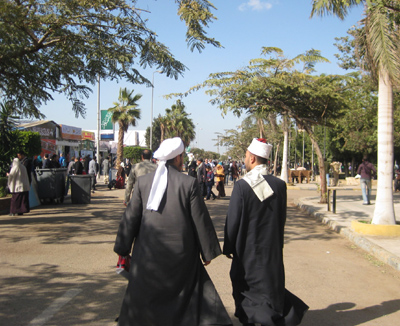
Two scholars walk and book shop.
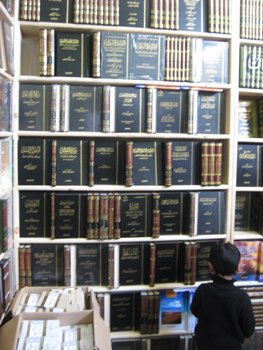
My son checking out books for his future collection.
– Bring something sturdy and large enough to carry all your books in. It’s not unusual to see students using large book bags and suitcases to carry their purchases at the fair.
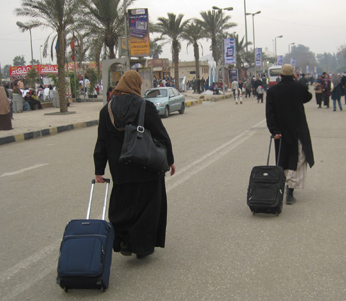
How students roll 🙂
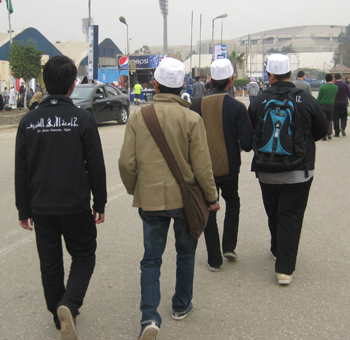
A group of Malaysian Azhari students at the fair.
– Try to go early since they do sell out of popular books. You may want to visit multiple times (as most students do), first focusing on getting what’s on your list and then browsing for new, interesting or discounted books.
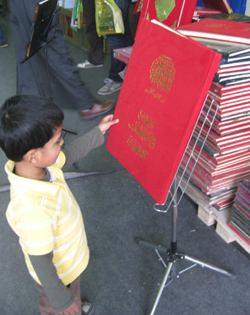
A large print Quran intended for easy reading during Tahajjud (night prayers)
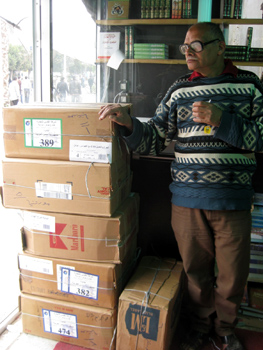
A bookseller stands with a stack of packaged books.
– Even if your Arabic is not at a level to appreciate the incredible selection of books available, you can find a lot of interesting things to see and enjoy. English books are also on sale, and kids books and toys can be found at places like Safeer, EduFun and other booths. You can also find artwork and other things on display in some of the larger tents. In a way the book fair is a celebration of books and learning, so it’s fun to be part of the experience even if you are not quite ready for those 15-volume works just yet 🙂
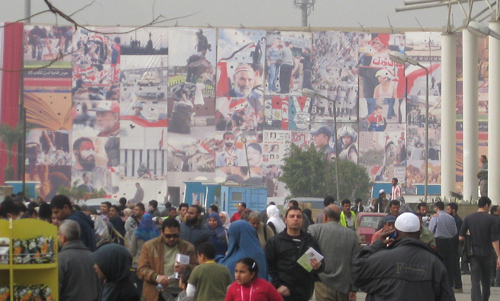
One of the amazing wall murals found all around the fair this year, honoring the revolution of the previous year.
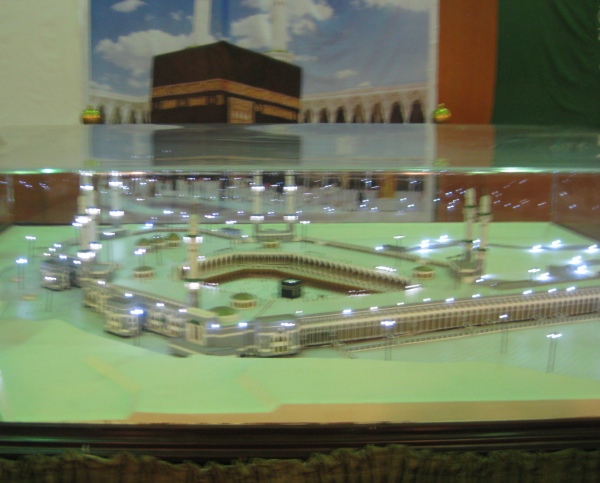
A miniature display of the Haram in the Saudi publishing tent.
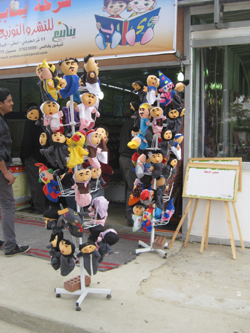
Hand puppets for sale outside one of the book shops.

Some artwork on display in one of the larger tents.
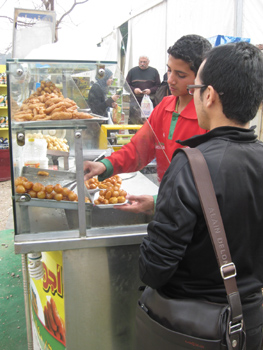
An attendee buying some snacks from one of the food stands set up at the fair.
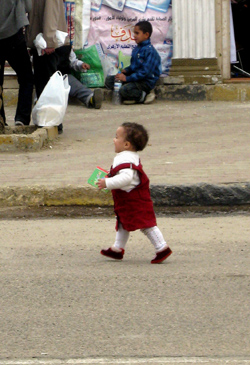
A little girl excited to get home and read her newest purchase 🙂
Traveling
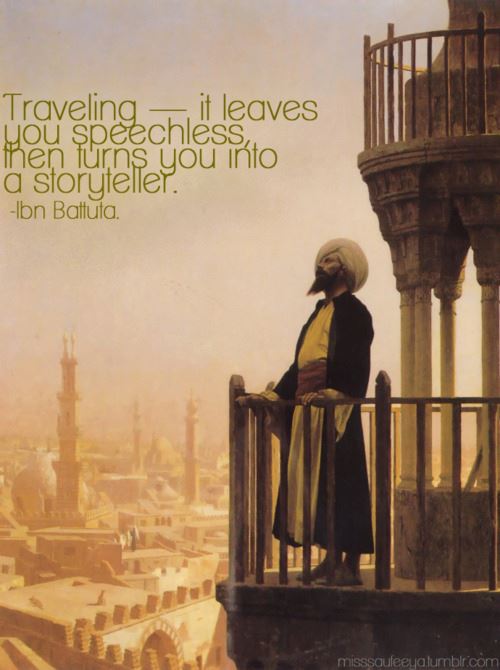
What the Prophet Taught Me
This is my submission to The Madina, in which people were asked to submit a creative work on the general theme of Islamic Values.
——————-
Be the captain of the ship,
Mustafa, my chosen one,
My expert guide.
Look how the caravan of civilization
Has been ambushed.
Fools are everywhere in charge.
Do not practice solitude like Jesus.
Be in the assembly,
And take charge of it.
So you should live most naturally out in public
And be a communal teacher of souls.
———–
Hope is the thing with feathers
That perches in the soul,
And sings the tune–without the words,
And never stops at all.
————————————————
We are in the Prophet’s Spring, Rabi’ al-Awwal, the blessed month in which it is reported that the Prophet Muhammad (salAllahu alayhi wa salam, may the peace and blessings of God be upon him) was born, in which he arrived in Madina after his migration (hijrah) and in which he passed away. In many ways it is ‘his’ month, a time when we increase in our remembrance of him, his life and teachings, and in our prayers upon him (salAllahu alayhi wa salam). Mercy to the worlds, lover of God, brother of men… who manifest every noble quality in his life and on his limbs, who was the best of character, and was sent but to perfect character – this is our beloved Prophet (salAllahu alayhi wa salam).
It is in this same month we find our hearts shaken by the slaughter of innocent men, women and children in Syria as a brutal regime desperately grasps at its fleeting hold on power. This is not the first time we have witnessed injustice and cruelty on the world scene, but it is the latest and most blatant example of such brutality, of deeds done by people who evidently have no fear of God, and the viciousness to which some will go for their own ends.
In the face of such ugliness, The Prophet’s beauty (salAllahu alayhi wa salam) and the beauty of his teachings are only more resplendent. His unwavering sense of God-consciousness, truth, justice, forgiveness, and kindness, the values he lived his whole life seeking to impart, only become clearer and more distinguished in the face of such wrongs. We can also hold fast to a sense of hope that colors the Prophet’s life (salAllahu alayhi wa salam) and deeds. Even when he encountered some of the worst of the life of this world and the worst of human nature, his belief in his Lord was constant, his faith luminous. With the weightiness of the prophetic mission, a life replete with tribulation and difficulty, and his community facing some of the worst of oppression and bloodshed, he (salAllahu alayhi wa salam) never lost himself in despair, but instead saw suffering through the lens of one who believes in Allah and knows that everything that happens is within His knowledge and from His wisdom. We see a hopefulness, a confidence in Allah’s plan, that brighter days were coming soon and that this ummah (community) has a future, by God’s leave. Instead of giving up, we see a lifetime of constant work and sacrifice in the way of God.
In this month we find ourselves in the refreshing spring of his (salAllahu alayhi wa salam) remembrance, contemplating the temperate winds of his devotion, the beauty of each blossom of his teachings in full bloom for us to admire and take in. Every small act of goodness, refined character, and God-consciousness is a reflection of his teachings (salAllahu alayhi wa salam) and the values he imparted. May we be hopeful people who know that the darkest hour always comes before the dawn, and who seek to imbue his teachings (salAllahu alayhi wa salam) in our lives and selves down to the marrow of our bones. Ameen.
______
The Prophet (salAllahu alayhi wa salam) taught me the value of…
Brotherhood and Sisterhood Across Race, Class or Color
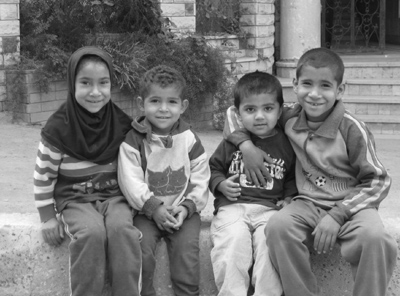
My little son with some neighborhood children in Cairo. The Prophet (peace be upon him) taught, “You are all as equal as the tooth of a comb”, and that “God does not look at your faces or bodies, but at your hearts.” (Tirmidhi)
Standing for Justice
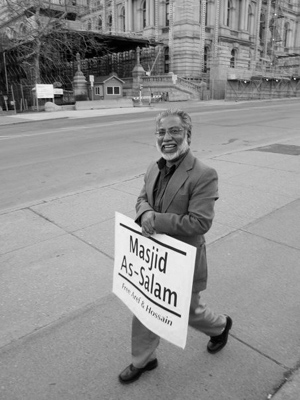
My father at a protest. In an FBI entrapment case which ensnared two members of the Albany Muslim community, my Dad was one of the very few of the older generation to step forward in support of the brothers who were prosecuted and their families. I really have never been prouder of him. The Prophet (peace be upon him) was a pillar of justice and stood with the oppressed.
Showing Love and Mercy for the Young
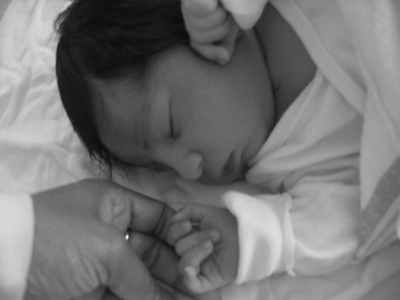
My son Ibrahim on his first day of life. The Prophet (peace be upon him) said, “He is not from us who does not show mercy to young children nor honor the elderly.” (Tirmidhi)
Remembering God
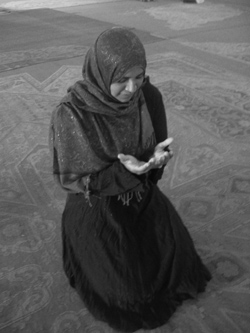
A woman supplicates at Masjid Muhammad Ali, Cairo. The Prophet (peace be upon him) taught that remembrance of God brings life and light to the spiritual heart and said, “What purifies and polishes the heart is remembrance of God.” (Bayhaqi)
Helping One Another
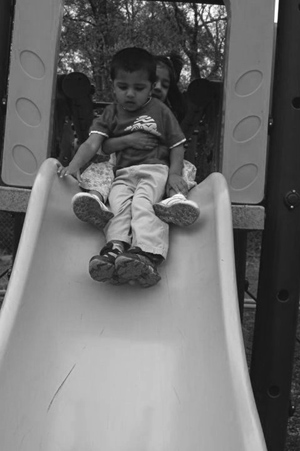
Cousins helping each other face new adventures. The Prophet (peace be upon him) said, ” If anyone fulfills his brother’s needs, Allah will fulfill his needs; if one relieves him of his troubles, Allah will relieve his troubles on the Day of Resurrection…” (Bukhari and Muslim)
Appreciating Beauty
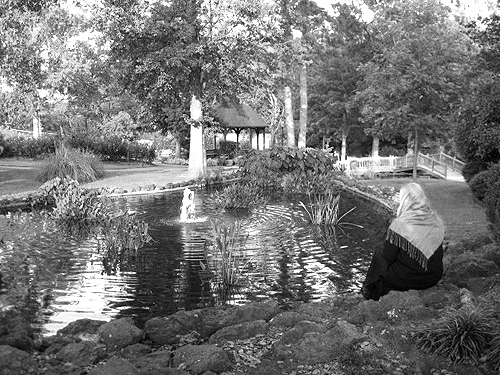
A lovely pool in a rose garden in Texas. The Prophet peace be upon him said, “God is beautiful and loves beauty.” (Muslim)
Walking the Path to a Greater Destination
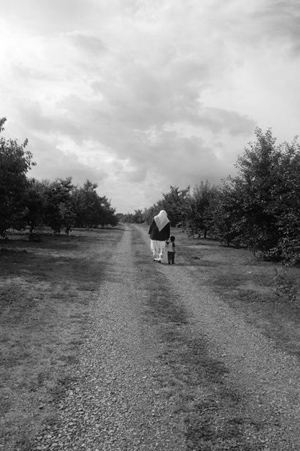
Mother and son reflecting on their journey. The Prophet (peace be upon him) advised us to live in this life “like a wayfarer or traveler” (Bukhari), to remember the transient nature of this world and strive to make our time, energy and efforts a path to a better place by God’s leave.
————
(Poetry by Rumi and Emily Dickinson, respectively)
The Advice of Waki`
One of the blessings of living in Cairo, a place where history seems to have left its mark everywhere one looks, is that it is home to many of the graves of notable righteous people, distinguished worshipers and scholars of Islamic history. It is an entirely different experience to read or hear about a person of the past and their incredible knowledge or devotion, and to stand at the foot of their grave. The first is cerebral; the second, a visceral, personal experience that forges a connection that is difficult to express. In some ways it bring life to a tradition that may seem static, and make real and tangible what seems abstract and elusive. It is also sobering to consider what great heights such people reached and how far we may have left to climb.
A few steps down from the masjid of Imam Shafi`i in Old Cairo lies the grave of one of his teachers, Waki` ibn Jarrah. His name is familiar to many of us through the famous lines of Imam Shafi`i:
شَكَوْتُ إلَى وَكِيعٍ سُوءَ حِفْظِي فَأرْشَدَنِي إلَى تَرْكِ المعَاصي
وَأخْبَرَنِي بأَنَّ العِلْمَ نُورٌ ونورُ الله لايؤتى لعاصي
I complained to Waki’ about my poor memory:
“Give up your sins!” was his advice to me;
“For knowledge is a light from Divinity,
and the Light of God is veiled by iniquity.”
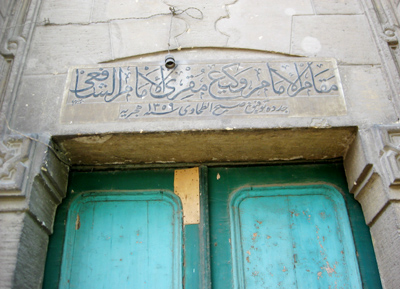
The maqam (grave) of Waki` ibn al-Jarrah
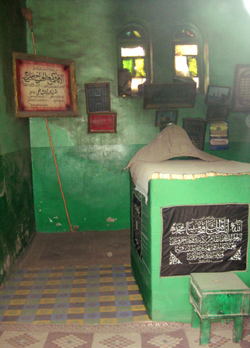
It is said that Imam Shafi`i was walking in the street one day when an inadvertent glance caused him to glimpse a woman’s shin, exposed by the wind as she was passing by. This momentary, seemingly negligible glance had its effect on his mind and heart, which led him to seek guidance from his teacher and resulted in these lines of poetry and profound wisdom.
Such a story seems almost incredulous in our times, when our senses are overwhelmed by a seemingly never-ending array of spiritually harmful things, often indulged in consciously.
In the Qasidat al-Burda Imam al-Busiri counsels,
واستفرغ الدمع من عين قد امتلأت من المحارم والزم حمية الندم
Pour out tears from those eyes that have become filled
With forbidden sights, and hold fast to remorse as a guard (against returning to sin).
My teacher pointed out the beautiful imagery of the language of this couplet, and the contrast of emptiness and fullness, the words chosen likening our eyes to actual physical containers or vessels. In these lines Imam Busiri counsels us to empty and pour out, by way of tears of regret and repentance, these vessels we have filled up with the forbidden, just as if they were physical vessels that we have consciously filled with impurity, that need to be emptied and cleansed.
We must ask ourselves, what have we filled our eyes with? And how can Divine light settle in a place that is filled to the brim with other things?
May Allah help us to heed Waki`’s advice to his student, honor us with light, and keep our spiritual gazes fixed on Him. Ameen.
